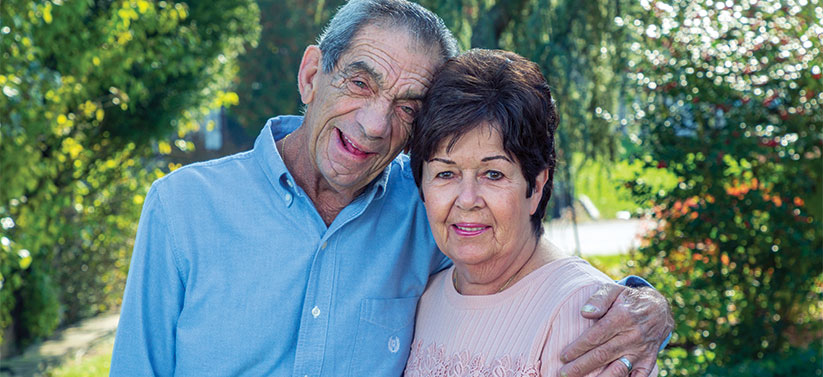
“I’ve been married to my sweetheart, Janet, for 59 years. We have three sons, three daughters-in-law, and nine grandchildren — all I can say is I’m so happy to still be here to see them,” says Lawrence D’Ercole. He made history for being the first patient in New Jersey and one of the first in the country to undergo a new kind of radiation therapy for lung cancer following its FDA approval in April 2018.
The initial symptoms were mild enough — a little weight loss and a cough. So, when he was diagnosed with stage I lung cancer, it came as all the more of a shock to him and his family. “They did a CAT scan and found a nodule on my upper left lung. The patient coordinator at Englewood Health recommended I see Dr. Dubin,” D’Ercole says.
Unbeknownst to D’Ercole, David Dubin, MD, chief of radiation oncology, and Michael Speiser, PhD, chief physicist, had just finished establishing stereotactic body radiation therapy (SBRT) with Varian Calypso® Anchored Beacon® transponders at The Lefcourt Family Cancer Treatment and Wellness Center.
Treating lung cancer with radiation therapy presents challenges. Ideal radiation treatment would target only the exact area of the tumor and no surrounding healthy tissue, but tumors in the lungs are constantly shifting position as the patient breathes. This motion typically requires larger treatment areas to ensure the moving tumor receives the full treatment. SBRT with Varian Calypso allows physicians to insert transponders — which act like a tiny GPS — around the tumor and track its whereabouts during radiation therapy 25 times a second. This makes the process much more precise and simultaneously spares the healthy tissue around the tumor.
“Mr. D’Ercole was a great candidate for this therapy,” says Dr. Dubin. “Not only was his tumor location appropriate, but he happened to be great at holding and controlling his breath, taking in the same amount of air with each inhale. Like any treatment, this won’t be appropriate in every case. Where the tumor is, the size of the patient, and the patient’s lung capacity all play a role. But this treatment should be the standard, in my opinion, simply because of how accurate it is,” Dr. Dubin says.
Two months after finishing radiation therapy, D’Ercole has started to feel better and has been spending a lot of time with his family. “I feel really lucky to have gotten to Englewood Health when I did. I’ve been there for other procedures and everyone is always great. I wouldn’t go anywhere else for treatment,” D’Ercole says.
Posted January 4, 2019
Other links or resources
Englewood Health News, Patient Care
First in New Jersey, and One of First in Nation, to Use New Technology for Treatment of Lung Cancer
